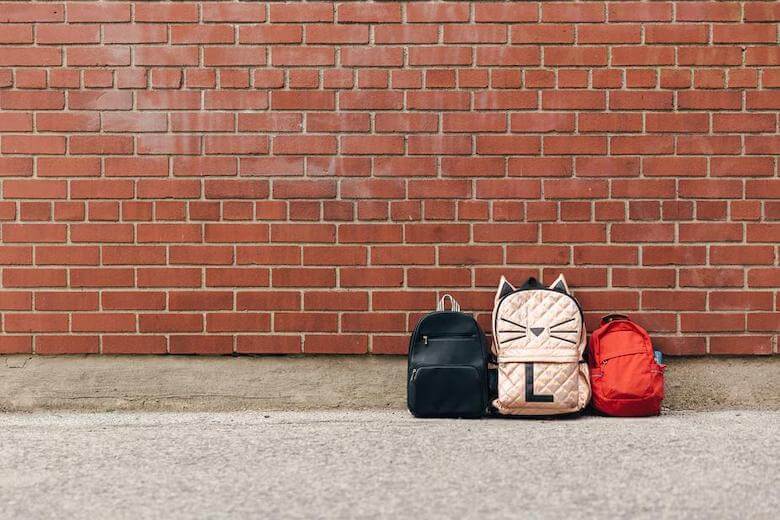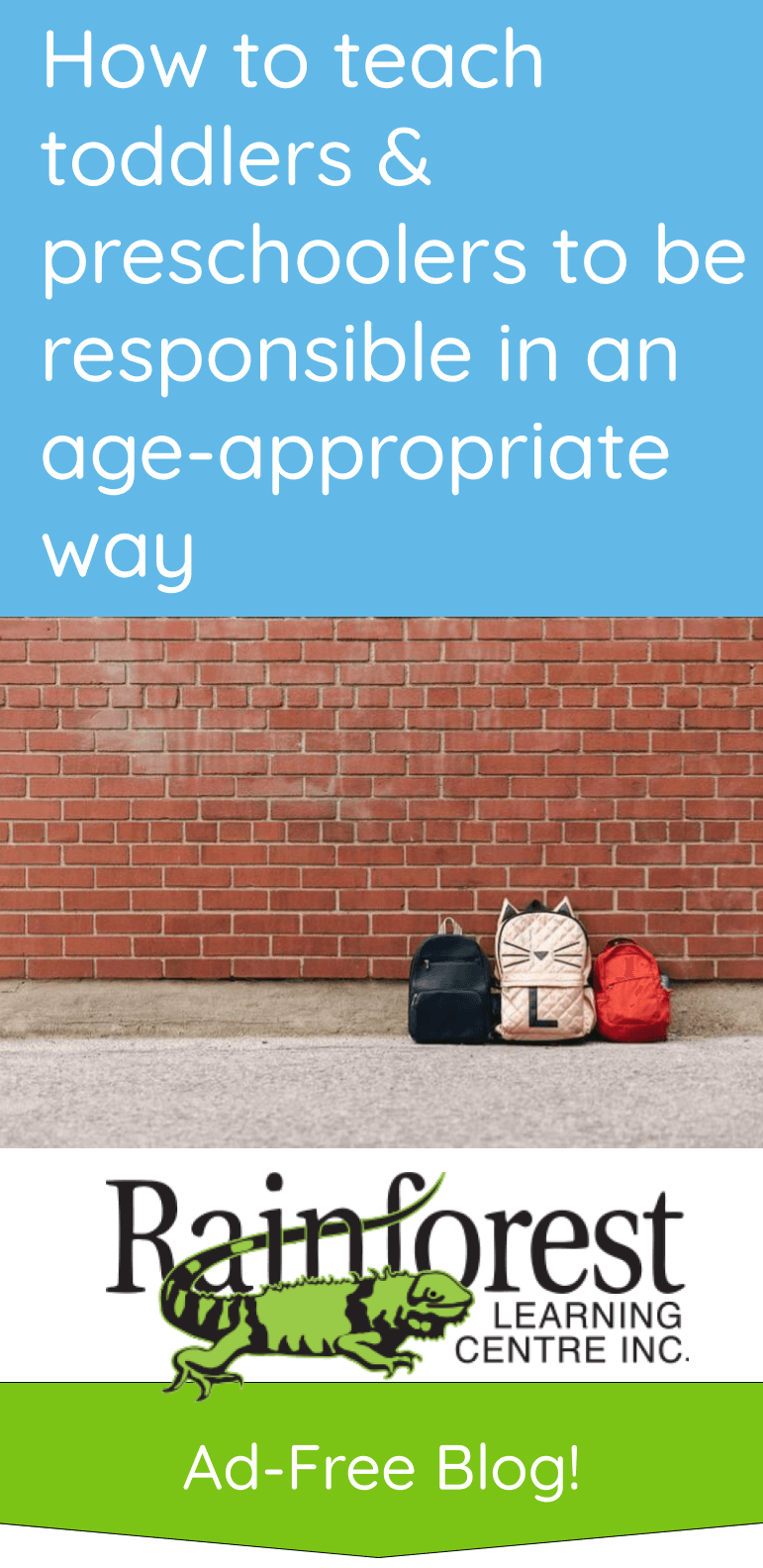
As adults, we may love it if little ones in our care – whether at home or at preschool – would be responsible for themselves, and always do the right thing. In an ideal world, they would always pick up their toys, clean up after themselves, wash their hands after going to the bathroom, put their shoes and jackets on, and be ready to go out the door on our adult timelines. And they would eat their veggies and learn academic stuff all by themselves too, because they would know how beneficial it is for their future.
But that’s probably not going to happen. In fact, the above scenario is so strange-sounding because in a way, it’s naturally ridiculous. Kids are kids. They need to be taught and trained by us loving (and sometimes impatient) adults.
So the question is: how do we teach toddlers and preschoolers to be responsible in an age-appropriate way, in their own right? What does responsibility look like for a 3 year old, 4 year old or 5 year old? Are we asking too much or too little of them, as caregivers?
Below we’ll attempt to answer those questions!
Teaching preschoolers responsibility is not about discipline and authority
As this article states so well, being responsible has nothing to do with obedience to an adult’s word. It has everything to with being aware that something needs to be done, and then doing it. It is about keeping one’s word, fulfilling promises, following through, and doing tasks that are beneficial to oneself and others, whether we like to do them or not.
Now, let’s break that down into 3-year-old language. You’ll find it’s not easy! So, this is going to take time. And, it’s not going to be obvious to the preschoolers that they need to be responsible for some things in their life.
So, at first, yes, this may involve being told what their responsibilities are, with consequences for not doing them. But this should eventually transfigure itself into a thought of, ‘oh, I do this because I’m supposed to, because it’s the right thing to do.’
Now, training a child to meet their responsibilities, like cleaning up their toys, takes a bit of parenting advice, and persistence. So, yes, discipline and authority are not completely void from this picture. However, they happen in an indirect way, that eventually leads to the end-goal of responsibility in children.
As the article mentioned above states, children who get everything they want, and never face the consequences of bad behaviour, will probably have a hard time being responsible. On the flip side, children who are not confident, and not shown love and acceptance, with positive, verbal reinforcement, may also struggle with this life lesson. So, kids need both.
Teaching toddlers and preschoolers responsibility needs to be age-appropriate, practical and meaningful
We can’t expect a toddler or preschooler to drive themselves to school, obviously. They need proper growth and maturity, humanly. While that’s an extreme example, the point is, they can’t do everything to be self-sufficient. But they can do little things. And may we dare say – little tots who know how to handle teeny tiny things might help reduce parenting stress throughout the day.
For example, a three year old should understand where toys go, and what to do with them after they are done playing with them. They should understand the concept of wiping their mouth with a napkin after eating (however imperfectly they may do it!). They can also hang up their towel on a hook they can reach. And, they can carry dishes to the sink, if it’s not too high (or help hand it to an adult).
A four year old should know to stop and look both ways before crossing the street. Four year olds, if they haven’t already learned, should know how to dress themselves. They should wash their own hands after using the bathroom, and of course, flush the toilet. They probably also have it in them to set the table, and help carry groceries inside the house too.
A five year old can feed their pet, pull weeds in the garden, pour their own drinks, and more. They can remember to bring home their backpack from school. And they can clean their room and turn off lights in the house or at school. They can brush teeth too, if they haven’t learned already. And, who says a little sweeping and dusting is too much for preschoolers? Nah – it’s good to start them off early! At preschool, they can help the teacher wipe boards, and organize pencils too
Below are some articles that talk about age-appropriate tasks for kids at different stages in life:
- https://afineparent.com/building-character/teaching-kids-responsibility.html
- https://thepreschooltoolboxblog.com/teaching-responsibility-in-preschool-through-practical-life-skills-teachece/
Do the toddlers and preschoolers forget their responsibilities sometimes? Sure. But they should know.
Keep in mind that some kids are just developing at different stages. Don’t expect that your kid should be doing all of the tasks that another kid is doing at a certain age. If you believe your child is far behind though, we would recommend seeking medical advice.
Now, when the kids do their job, especially of their own volition, it’s good to give praise (even if only at first). And be specific. Say, “wow, thank you for cleaning up your toys! You did a great job!” Show them they are making a difference. It can make the job meaningful to them.
You can also make chores practical, in their little minds, by telling them things like, “Oh look, you cleaned up the play-dough! Now we have room to play with legos! Otherwise, we would be too squished in here.” Or, “great, your hands are clean, now we can eat!” In short, give them a sense of sequence and logic, as to why these tasks need to be done.
Teaching kids responsibility requires modelling responsible behaviour, and working together
Let’s not forget that if we adults are not hanging up our coats, or doing what we say we’re going to do, we’ll be showing our kids that responsibility is not that important. While these things may be trivial to us, and we may have our ‘grown up’ reasons for not doing them, remember that toddlers and preschoolers don’t see, nor understand, all the other ‘big’ responsible things you do, that overshadow the little things you’re missing. They don’t see you at work, and they surely can’t understand managing a household budget at this stage in life.
So, as much as you can, try to model the responsible behaviour that you want to emulate in your children. This goes for early childhood educators at daycares and preschools too! They should be seen putting books away, and making note of it to the class, after story time, for example. They should be washing hands after going to the bathroom, and before baking cookies. You get the idea…
In fact, this blogger states that the wording should be inclusive. The adult should say “now we do X,” to show that everyone is responsible for a certain task.
Then, when a problem arises, it’s good to work together with the toddlers and preschoolers to come up with a solution. For example, is a little kid feeling left out or bullied? How can we be responsible to make that child feel welcomed? What can we play with together? Did we tell the teacher right away?
What about recycling? Can we all save the planet together by bringing our bottles to school for a recycling drive? Or, how can we use up all this scrap paper instead of throwing it away?
These are great conversations to have with preschool-aged children to create awareness about social responsibility.
See related posts on our blog:
- Reasons and ideas to teach preschoolers about recycling
- Community service learning ideas for early childhood education and daycare
To conclude: teaching toddlers and preschoolers to be responsible is part of ‘real life’ learning, with life-long impact
As we’ve seen above, many of the lessons about responsibility in early childhood will come from experiential, practical and daily-life moments. Adults can take the opportunity to show a little one how to clean something, follow a routine, ‘see something say something,’ and so on. We can teach children what is needed from them, at the right time. And then, we can reinforce that lesson until it’s no longer about ‘obeying.’ Hey it might even turn into an automatic response with awareness about why it has to be done (if, “because I told you so” doesn’t work so well in your house).
This can be a bit of an uphill battle for some kids – especially if they’ve not been handed responsibilities until the point at which you decided to start enforcing them. Yes, some whining and crying and “you’re not fair” accusations may occur.
But remember, kids need to learn that sometimes, life is not always about what we like to do (which is to take a vacation and have servants feed us grapes by hand! Ha!). Life is full of responsibilities. It’s how the world works. If preschoolers learn to be responsible for themselves and others now, in an age-appropriate way, they can continue to build on those lessons in future life scenarios, when responsibility gets more serious.
See related posts on our early childhood education blog:
- 4 Benefits of daycare ‘buddy time,’ when older kids mentor preschoolers
- How to find and use teachable moments as an early childhood educator
- What is social competence in the early years?
- 3 ways to build confidence in young children
- 3 ways to build self-awareness in early childhood
- What is normal emotional intelligence in toddlers and preschoolers?
